The Olympics
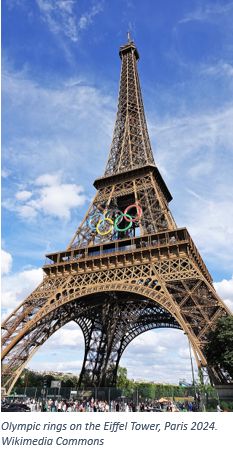 6
6Aug
The History of the Olympic Games
Full of danger, passion, and extraordinary feats of athletic ability, the ancient Olympic Games were the sporting, social, and cultural highlight of the Ancient Greek calendar for almost twelve centuries. Beginning in 776 BCE in Olympia, Greece, the early Games were part of a religious festival held in honor of Zeus, the king of the Greek gods. The Games were held every four years, a period known as an Olympiad, which became a unit of time in the ancient Greek calendar.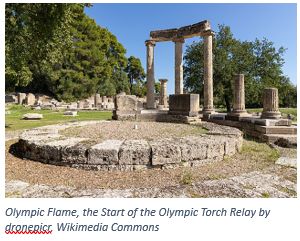
Initially, the Games lasted only one day and featured a single event: a foot race known as the stadion, which was a sprint event over a distance of 600 feet. The winner of this race (the first of whom was a cook and baker named Coroebus) had the honor of their name being given to that four-year Olympiad. The stadion was named after the building in which it took place, which is where the word “stadium” comes from in English.
Over time, the festival expanded to five days and included various events such as wrestling, boxing, long jump, javelin, chariot racing, and discus throw. At least 40,000 spectators would have packed the stadium each day at the height of the Games’ popularity. Athletes competed not only for the glory of victory but also for tangible prizes, such as olive wreaths and valuable goods.
Participation in the ancient Olympics was open to all free Greek males, from farmhands to royal heirs. Women were not allowed to compete or even attend the Games, though there were separate festivals for women, such as the Heraean Games in honor of the goddess Hera. There was, however, a loophole to the misogynistic rule barring women from competing with the men – chariot owners, not riders, were declared Olympic champions and anyone could own a chariot. Kyniska (or Cynisca), daughter of a Spartan king, took advantage of this rule, claiming victory wreaths in 396BC and 392BC with horse teams she had trained herself.
The ancient Olympic Games continued for nearly twelve centuries, until they were abolished in 393 CE by the Roman Emperor Theodosius I, who viewed them as a pagan festival inconsistent with Christian values. For over 1500 years, the Olympic spirit lay dormant until its revival in the late 19th century.
Fun Facts about the Ancient Games:
- All athletes competed naked
- Wrestlers and pankration (an event that combined boxing and wrestling) competitors fought covered in oil
- Corporal punishment, usually beating with a stick or whip, awaited those guilty of a false start on the track
- The pankration only had two rules – no biting and no gouging
- Boxers were urged to avoid attacking the on-display male genitals
- There were no points, no time limits, and no weight classifications in the boxing
- Athletes in the combat sports had to indicate their surrender by raising their index fingers – sometimes dying before they could
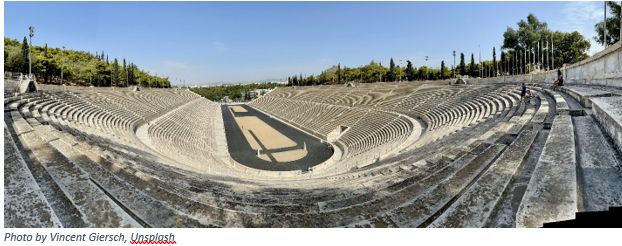
The Modern Olympic Movement
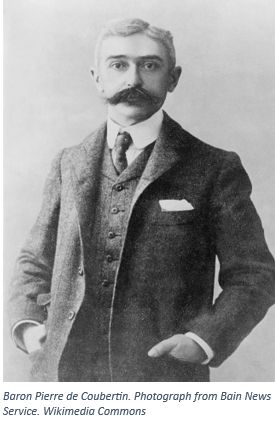 The modern Olympic Games owe their resurgence to the efforts of Pierre de Coubertin, a French educator and historian. Spurred by his fascination as a boy with Greece and Olympia and motivated by a desire to promote international peace and understanding through sports, Coubertin founded the International Olympic Committee (IOC) in 1894. Two years later, the first modern Olympic Games were held in Athens, Greece, in 1896.
The modern Olympic Games owe their resurgence to the efforts of Pierre de Coubertin, a French educator and historian. Spurred by his fascination as a boy with Greece and Olympia and motivated by a desire to promote international peace and understanding through sports, Coubertin founded the International Olympic Committee (IOC) in 1894. Two years later, the first modern Olympic Games were held in Athens, Greece, in 1896.
The inaugural modern Olympics featured 14 nations and 241 athletes competing in 43 events. Unlike the ancient Games, the modern Olympics were open to athletes from around the world, regardless of their nationality. The Games included a variety of sports, such as athletics, swimming, cycling, fencing, and gymnastics.
Female athletes were first allowed to compete in the 1900 Paris Games, participating in tennis and golf. At the time, the 22 participating women accounted for just 2% of the total athletes. Over the years, the number of women's events and their participation has steadily increased, reflecting broader social changes and the push for gender equality in sports. This year at the 2024 Sumer Olympics in Paris, an equal number of men and women will be competing for the first time in Olympic history.
Olympic Families
While individual triumphs are often celebrated, the stories of families who compete together or across generations add a rich layer of narrative to the Games. These families not only contribute to the sporting legacy but also highlight the values of unity, support, and shared aspirations.
Family participation in the Olympics can take various forms. In some cases, multiple members of the same family compete in the same Olympics, while in other instances, the sporting legacy is passed down through generations. These families often share a deep-rooted passion for sports, which becomes a central part of their identity and lifestyle. Training regimens, dietary plans, and even vacations are often structured around athletic pursuits, creating a unique environment where sports and family life are intertwined.
The support system within these families is crucial. Parents who are former Olympians themselves often serve as coaches or mentors to their children, providing not only technical expertise but also emotional support. Siblings who compete together often push each other to excel, fostering a healthy rivalry that enhances their performance. This dynamic creates a nurturing yet competitive environment that is conducive to producing elite athletes.
Throughout the history of the Games, several families have made a significant impact. Here are just some of the related athletes who have competed at the Olympics:
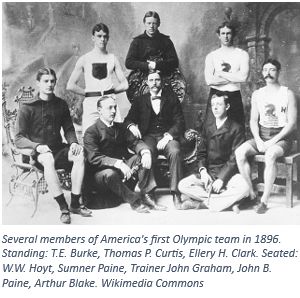 The first brother and sister to win Olympic medals were William and Charlotte Dod, who both won medals in their respective archery competitions in 1908.
The first brother and sister to win Olympic medals were William and Charlotte Dod, who both won medals in their respective archery competitions in 1908.- The first brothers to win Olympic gold medals were Americans John and Sumner Paine - they came first in the military pistol and free pistol shooting events at the first Olympic Games in 1896.
- British athlete Godfrey Brown won gold and silver in the 400 yds and 4x400 relay in 1936, and his sister Audrey Brown won the silver on the same day in the women’s 100 yd relay.
- The first time in which a mother and daughter competed in an Olympic event together was the golf tournament of 1900. Mary Abbott, a novelist, finished seventh, while her daughter, Margaret Abbot, won the event.
- Kenyan born distance runner Bernard Lagat is a five-time Olympian, having competed in the 2000, 2004, 2008, 2012 and 2016 games. In 2016, he was joined at the Games by his sister Viola Lagat, who is also a runner.
- Siblings Uta Abe and Hifumi Abe from Japan won individual gold medals in judo on the same day at the 2020 Olympics in Tokyo, Japan.
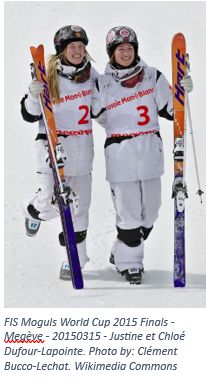 Three Canadian sisters competed in women's moguls at Sochi 2014 - Justine Dufour-Lapointe (gold), Chloe Dufour-Lapointe (silver) and Maxime Dufour-Lapointe (12th).
Three Canadian sisters competed in women's moguls at Sochi 2014 - Justine Dufour-Lapointe (gold), Chloe Dufour-Lapointe (silver) and Maxime Dufour-Lapointe (12th).- At the 1988 Winter Olympics, four brothers made up both of Mexico's teams in the 2-man bobsled event - Eduardo, Jorge, Adrian, and Roberto Tames – the highest number of siblings to compete in a single Winter Olympic Games event.
- Triplets Leila, Liina, and Lily Luik from Estonia made history when they took part in the marathon at the Rio Olympics, becoming the first identical triplets to compete against each other.
- Princess Anne of the United Kingdom and her former husband Captain Mark Phillips met through equestrian events. Phillips was a member of the British three-day event team, which won the gold medal at the Munich Olympics and in 1988 won silver in the same event. Anne competed as a member of the UK equestrian team in 1976. Their daughter Zara Tindall competed in the equestrian events at the 2012 London Olympics.
 The benefits of family participation in the Olympics extend beyond the medals and accolades. The shared experiences of training, competing, and overcoming challenges together strengthen family bonds and create lasting memories. The sense of pride and accomplishment that comes from representing one's country on the world stage is amplified when shared with loved ones.
The benefits of family participation in the Olympics extend beyond the medals and accolades. The shared experiences of training, competing, and overcoming challenges together strengthen family bonds and create lasting memories. The sense of pride and accomplishment that comes from representing one's country on the world stage is amplified when shared with loved ones.
Moreover, the legacy of Olympic families often inspires future generations. Young athletes who grow up hearing stories of their parents' or grandparents' Olympic achievements are motivated to pursue their own dreams. This continuity helps to maintain and elevate the standards of excellence in sports, contributing to the overall progress and development of athletic disciplines.
The history of the Olympic Games is a testament to the enduring human spirit and the pursuit of excellence. From their ancient origins in Greece to the grand international spectacle they are today, the Olympics have evolved significantly, reflecting changes in society, culture, and technology. Despite the challenges and controversies, the Games continue to inspire and unite people around the world, embodying the Olympic motto: "Citius, Altius, Fortius" - "Faster, Higher, Stronger." As the Olympics look to the future, they remain a powerful symbol of global unity and the unyielding quest for human achievement.
Do you have any ancestors who competed in sports or had other athletic endeavors? At Price Genealogy we can help you learn more about your ancestors. Contact us today!
Rebekah
Sources:
- “Olympic History - from the Home of Zeus in Olympia to the Modern Games.” Com, 2024, olympics.com/ioc/ancient-olympic-games/history.
- Miller, Stephen G. (2004). Ancient Greek Athletics. New Haven: Yale University Press. pp. 31. ISBN 978-0-300-10083-9.
- Young, Lauren. “When Ancient Greece Banned Women from Olympics, They Started Their Own.” Atlas Obscura, Atlas Obscura, 22 July 2021, www.atlasobscura.com/articles/when-ancient-greece-barred-women-from-even-watching-the-games-they-started-their-own-olympics.
- Welwei, Karl-Wilhelm (Bochum), "Cynisca", in: Brill's New Pauly, Antiquity volumes edited by: Hubert Cancik and, Helmuth Schneider, English Edition by: Christine F. Salazar, Classical Tradition volumes edited by: Manfred Landfester, English Edition by: Francis G. Gentry.
- The End of the Ancient Games, 2024, olympics.com/ioc/ioc-overview/ioc-history/ancient-olympics/the-end-of-the-ancient-games.
- “Welcome to the Ancient Olympic Games.” Com, olympics.com/ioc/ancient-olympic-games. Accessed 1 Aug. 2024.
- “Peirre de Coubertin.” Com, https://olympics.com/ioc/pierre-de-coubertin. Accessed 1 Aug. 2024.
- Reid, Helen. Women Athletes Say the Work Isn’t over after Olympics Gender Parity | Reuters, 28 July 2024, www.reuters.com/sports/olympics/women-athletes-say-work-isnt-over-after-olympics-gender-parity-2024-07-28/.
- “Olympic Families.” Olympic Families - Related Olympians, www.topendsports.com/events/summer/families.htm. Accessed 1 Aug. 2024.
